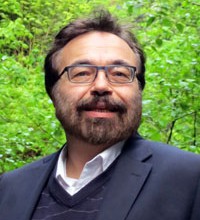Distributed Estimation Using Wireless Sensor Networks
Envisioned applications of wireless sensor networks (WSNs) include surveillance, monitoring
and tracking tasks. These motivate well decentralized estimation and smoothing of
deterministic and (non)stationary random signals using (possibly correlated) observations
collected across distributed sensors. In this talk we present state-of-the-art algorithms for
consensus-based distributed estimation using ad hoc WSNs where sensors communicate
over single-hop noisy links. The novel framework reformulates basic estimation criteria such
as least-squares, maximum-likelihood, maximum a posterior, and linear mean-square error,
as decomposable, constrained, convex optimization problems that are amenable to
distributed solutions. The resultant distributed estimators are provably convergent to their
centralized counterparts and robust to communication noise. Besides stationary, the
framework encompasses prediction, estimation and smoothing of non-stationary signals
through distributed Kalman filtering.

Georgios B. Giannakis
Professor of Electrical and Computer Engineering, University of Minnesota on April 18, 2008 at 12:00 PM in Engineering Building II, Room 1230
Professor G. B. Giannakis received his B.Sc. in 1981 from the
Ntl. Tech. Univ. of Athens, Greece and his M.Sc. and Ph.D. in
Electrical Engineering in 1983 and 1986 from the Univ. of
Southern California. Since 1999 he has been a professor with
the Department of Electrical and Computer Engineering at the
University of Minnesota, where he now holds an Endowed ADC
Chair in Wireless Telecommunications. His general interests
span the areas of communications, networking, signal
processing, estimation and detection theory -- subjects on which
he has published more than 250 journal papers, 450 conference
papers, two research monographs and two edited books. Current
research focuses on wireless networks, complex-field and space-time coding, ultra-wideband
and cognitive radios, cross-layer designs and wireless sensor networks. He is the (co-)
recipient of six best paper awards from the IEEE Signal Processing (SP) and
Communications Societies (1992, 1998, 2000, 2001, 2003, 2004) and also received the SP
Society's Technical Achievement Award in 2000 as well as the EURASIP Technical
Achievement Award in 2005. He is an IEEE Fellow since 1997 and has served the IEEE in
various editorial and organizational posts
The Department of Electrical and Computer Engineering hosts a regularly scheduled seminar series with preeminent and leading reseachers in the US and the world, to help promote North Carolina as a center of innovation and knowledge and to ensure safeguarding its place of leading research.
